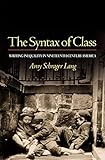The Syntax of Class : Writing Inequality in Nineteenth-Century America / Amy Schrager Lang.
Material type: TextPublisher: Princeton, NJ : Princeton University Press, [2009]Copyright date: ©2003Edition: Course BookDescription: 1 online resourceContent type:
TextPublisher: Princeton, NJ : Princeton University Press, [2009]Copyright date: ©2003Edition: Course BookDescription: 1 online resourceContent type: - 9780691113890
- 9781400825639
- 813/.309355 22
- PS374.S68 L36 2006
- online - DeGruyter
- Issued also in print.
| Item type | Current library | Call number | URL | Status | Notes | Barcode | |
|---|---|---|---|---|---|---|---|
 eBook
eBook
|
Biblioteca "Angelicum" Pont. Univ. S.Tommaso d'Aquino Nuvola online | online - DeGruyter (Browse shelf(Opens below)) | Online access | Not for loan (Accesso limitato) | Accesso per gli utenti autorizzati / Access for authorized users | (dgr)9781400825639 |
Frontmatter -- CONTENTS -- Acknowledgments -- Introduction: Class, Classification, and Conflict -- Chapter I. Home, in the Better Sense -- Chapter II. Orphaned in America -- Chapter III. Indexical People -- Chapter IV. Beginning Again -- EPILOGUE -- Notes -- Index
restricted access online access with authorization star
http://purl.org/coar/access_right/c_16ec
The Syntax of Class explores the literary expression of the crisis of social classification that occupied U.S. public discourse in the wake of the European revolutions of 1848. Lacking a native language for expressing class differences, American writers struggled to find social taxonomies able to capture--and manage--increasingly apparent inequalities of wealth and power. As new social types emerged at midcentury and, with them, new narratives of success and failure, police and reformers alarmed the public with stories of the rise and proliferation of the "dangerous classes." At the same time, novelists as different as Maria Cummins, Nathaniel Hawthorne, Frank Webb, Elizabeth Stuart Phelps, and Horatio Alger Jr. focused their attention on dense engagements across the lines of class. Turning to the middle-class idea of "home" as a figure for social harmony and to the lexicons of race and gender in their effort to devise a syntax for the representation of class, these writers worked to solve the puzzle of inequity in their putatively classless nation. This study charts the kaleidoscopic substitution of terms through which they rendered class distinctions and follows these renderings as they circulated in and through a wider cultural discourse about the dangers of class conflict. This welcome book is a finely achieved study of the operation of class in nineteenth-century American fiction--and of its entanglements with the languages of race and gender.
Issued also in print.
Mode of access: Internet via World Wide Web.
In English.
Description based on online resource; title from PDF title page (publisher's Web site, viewed 08. Jul 2019)


